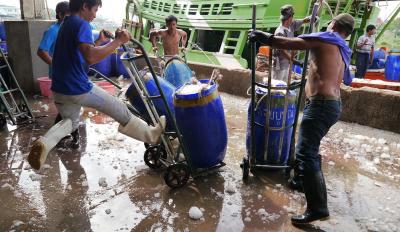
For Immediate Release: July 2, 2021
Thailand Downgraded in U.S. Trafficking in Persons Report Due to Failure to Address Forced Labor of Migrant Workers
Washington, D.C. - The U.S. Department of State released its 2021 Trafficking in Persons (TIP) Report on Thursday, downgrading Thailand to Tier 2 Watch List. The report found the Thai government did not demonstrate overall increasing efforts to address trafficking compared to the previous year nor has it effectively addressed the forced labor of migrant workers. Numerous reports and investigations have implicated Thailand in labor abuses and trafficking of migrant workers, particularly in the fishing, seafood and garment sectors. Thailand was listed as Tier 2 for the three years prior and this decision to downgrade gives important recognition that the government has failed to sufficiently address this problem.
In April, the Seafood Working Group -- a global coalition of 30 labor, human rights, and environmental organizations -- submitted comments to the U.S. Department of State recommending that Thailand be downgraded to Tier 2 Watch List. The working group noted that Thailand had not met the minimum standards set forth in the U.S. Trafficking Victims Protection Act of 2000.
The U.S. 2021 TIP Report highlights critical issues that led to this downgrade, including:
- The Thai government initiated significantly fewer trafficking investigations, prosecuted fewer suspects, and convicted fewer traffickers in 2020 than the year prior.
- Despite widespread reports that forced labor was prevalent among migrant workers in many industries in Thailand, the government identified a low number of labor trafficking victims compared to the scope of the problem, officials often lacked an understanding of labor trafficking, and the government lacked standard procedures for labor inspectors to refer potential cases to law enforcement.
- Thai authorities have never reported identifying a victim of labor trafficking as a result of fishing vessel inspections conducted at ports.
- Corruption and official complicity continued to impede anti-trafficking efforts.
- Labor laws prevented migrant workers from forming labor unions which may have further contributed to exploitation.
- Thailand’s criminal defamation laws continued to allow companies to pursue criminal charges against potential victims and advocates, including through strategic lawsuits against public participation, which resulted in advocates facing years of legal harassment.
- Workers in the seafood processing and fishing sectors increasingly faced forced overtime as a result of increasing demand for shelf-stable seafood during the pandemic, as well as unsafe working conditions. Vessel owners, brokers, and senior vessel crew subject Thai, Burmese, Cambodian, Vietnamese, and Indonesian men and boys to forced labor on Thai and foreign-owned fishing boats.
In response to this decision, JJ Rosenbaum, Executive Director of Global Labor Justice-International Labor Rights Forum (GLJ-ILRF) commented:
“Thailand’s downgraded status in the 2021 TIP Report reflects well documented and concerning trends. This downgraded status is consistent with the U.S. government’s withdrawal of trade preferences based on extreme workers’ rights exploitation particularly in the fishing sector and in relation to migrant workers. We urge the Thai government to take concrete steps to promote freedom of association including ratification of ILO conventions 87 and 98 as a strong antidote to forced labor and labor trafficking concerns. Freedom of association protections must also be applied in a nondiscriminatory way without regard to migration status.”
Adisorn Kaerdmongol, Coordinator of the Migrant Working Group (MWG) commented:
“COVID-19 has exposed underlying weaknesses of Thailand’s anti-trafficking infrastructure, particularly the way it fails to see the interlinkage between human trafficking and regularization of migrant workers. Instead of grasping how potential trafficking victims like migrant workers would be even more vulnerable in the face of the pandemic, the government instead compounded the workers’ vulnerabilities by stepping up their operation to crack down on undocumented workers and workers with invalid documents to show off their efforts to contain COVID-19. Arrested workers were deported without screening regardless of whether they might have been under forced labor conditions at a time when COVID-19 intensified economic distress that in turn tended to worsen human rights and labor rights abuses.”
Papop Siamhan, Director of Human Rights and Development Foundation (HRDF) commented:
“The abuse and exploitation of migrant workers in the fishing sector is persistent and ongoing. As the TIP Report highlights, fishers face wage theft, work without contracts, regularly incur debts from brokers and employers, work as much as 18 to 20 hours per day for seven days a week and without adequate food, water or medical supplies and face threats and physical violence by captains. Hopefully this very appropriate downgrade will push the Thai government to finally hold fishing vessel owners accountable for the abuses they are committing every day against migrant fishers.”
Migrant worker rights activist (name withheld for security reasons):
"Especially considering the way the Thai Government has managed migrants using a security framework under the regulations related to controlling COVID-19, we have only seen migrants' vulnerability increase and their rights deteriorate. The veneer of improvement that led to the prior TIP report upgrade has been stripped away, and Thailand is rightfully back on the Tier 2 Watch List. Core issues remain which have not been addressed, and only improvements in those issues, such as allowing migrants to organize unions, and a reformed registration system, will demonstrate the Thai government is really committed to protecting migrant workers' rights and preventing human trafficking."
###
(Image credit: Solidarity Center)
